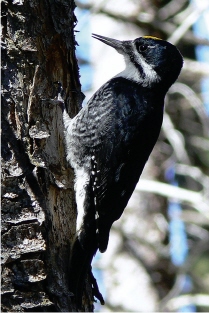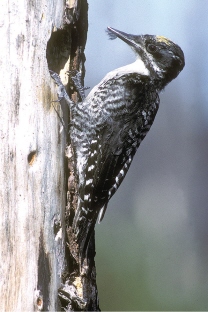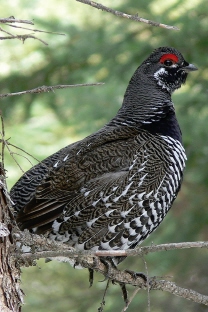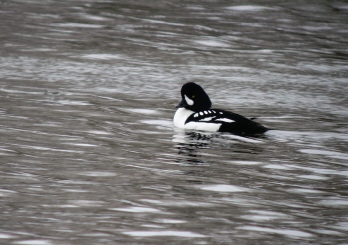The Reluctant Twitcher (7 page)


Photo by
Andrew Don.
Black-backed Woodpecker
(male). Algonquin
Provincial Park. Aptly
named, this boreal species
loves dying spruce.
We all get back to the road alive. Success is sweet.
But still no Spruce Grouse or American Three-toed Woodpecker. Nobody else has seen this rare woodpecker and only Jim Fairchild has seen one Spruce Grouse. Late in the day we search the spruce bog where Jim saw the grouse, but no luck. Margaret patrols the road and Hugh and I plow around in the bog. When I come out of the bog, I see Hugh talking to Margaret and every once in a while taking little stamping ten-metre runs, pounding his feet like a young goat trying out new hooves.
What now?
I wonder. In our last half hour this troubling behaviour only increases, until we get into the car and head back to Whitney for supper.

Photo by
Mark Peck.
American Three-toed
Woodpecker (male).
Churchill, Manitoba. In
the Algonquin area, this
quiet, uncommon bird is
usually very hard to find.
As we eat, Margaret comments on how fortunate it is that we all stayed so warm even at minus thirty. Hugh allows as to how his feet got “a bit cold near the end,” but otherwise he is fine. Now, you should know that Hugh birds almost exclusively in tennis shoes year round since his feet get sore otherwise. In the winter, he occasionally puts on loose-fitting open galoshes over the tennis shoes.
“I wonder how he keeps the snow out of his boots.” Margaret says.
“Beats me,” I reply.
Looking forward to an early night, we retire to our rooms. I just get my head on the pillow when the TV suddenly blares and Brother Currie commences some prolonged channel surfing, until finally lighting upon a film, which he says should be really good.
“Watch whatever you like,” I say. “Nothing will keep me awake.”
How wrong I am.
Night of the Killer Mutants
does just that. The death screams and hideous torturing keep on for so long I actually begin to watch myself. Hugh seems to be enjoying it immensely. It's so bad, it's actually interesting.
“It can't go on much longer,” I remark after what seems like hours. “Nearly everybody's dead.”
“The baby's still gotta get it,” says Hugh. He knows these things.
We still talk about it.
The next morning Hugh's feet are still cold. I tell him to put on more socks. He does. As we are leaving, he says his feet are
still
cold. And seem wet, if he is not mistaken.
“This won't do,” I say. “You're going to put on my extra slush-eaters with the felt liners and two pairs of dry wool socks. Take your galoshes off.”
He wants to get going but grudgingly agrees. As he pulls off the first galosh, a great cascade of water comes rushing out. The boot was full of snow all night. Half of the water has already been absorbed by his tennis shoe and socks, but the rest pours out merrily.
Knowing Margaret will never believe this, I take the other boot out to the car and pour the water out of it in front of her. We exchange meaningful looks.
Ten minutes later, with Hugh in warm dry slush-eaters and wool socks, we set out to nail the Spruce Grouse and American Three-toed. Everyone else has gone home and we are the only ones searching. No one found a Three-toed Woodpecker on Friday or Saturday. Things look rather grim.

Photo
by Andrew Don.
Spruce Grouse (male).
Algonquin Provincial
Park. True to its nickname,
this “fool hen” just sat
and gawked in one of its
beloved spruce trees.
The bird god, however, is with us. At the Spruce Bog Trail, where yesterday there was nothing, we almost immediately get both species. True, Margaret has a bad moment with the woodpecker because her binoculars can't focus under three metres and the bird is almost on top of her, but we cope even with this.
It is hard not to gloat on the way home. We are the only ones to get Common Redpoll and Three-toed Woodpecker and we get all our target species. This does not happen very often. You have to gloat when you get the chance. Believe me.

Once more unto the breach, dear friends, once more.
â S
HAKESPEARE
,
H
ENRY
IV
, A
CT
III
B
UOYED BY MY SUCCESS IN
Algonquin, I move to the attack.
One can't just sit around and wait for May. Anything good comes up, I'm going to chase it.
A Barrow's Goldeneye turns up again at Presqu'ile Provincial Park and Hugh and I are instantly in hot pursuit. Should be a piece of cake. Fred Helleiner keeps seeing it out his back window. The bird is becoming tiresome.
Once, twice, thrice the bird eludes us. On the third trip we view every goldeneye in the Park, except for fifty that fly just before dark as we check our last likely spot. Hugh is sure the Barrow's is among them. He lapses into bitterness and despondency and ponders both giving up birding and death; he says we seem to be the kiss of death. Otherwise he is fine.
The next day, January 30, I return alone and scour the park again. After several hours of fruitless searching, I spy a small flock of goldeneye through the trees on the way to the lighthouse. It will mean traipsing through the snow with improper footwear, but what the hell. Just before staggering out onto the shore, I take a quick peek through the bins in case they flush, and the first bird I see is the Barrow's. Satisfaction is a weak and inadequate word for the feeling one gets at such moments. I am cold and my feet are frozen, but I have found the Grail!
On the way home I decide not to vouchsafe this information to Hugh at this particular time. I'll wait until the despair lifts, you know.
Margaret phones on the evening of February 17. She has just seen a Greater White-fronted Goose and gives precise directions. It's a no-miss situation. Early the next morning I race to the “roadside field simply full of geese” and see a barren expanse of corn stubble, albeit with a creditable quantity of droppings that appear to be on the fresh side. One misshapen European Starling forages briefly in the back corner and then vacates, doubtless having realized that the kiss of death has arrived.
Don't just stand there staring, Stupid
, I tell myself.
Think,
Poper, think. You can do this. It's not your long suit, but think.
Think like a bird. Where might the geese be now? Hmmm ⦠in
the water? Lake Ontario is only one field away. After a good early-
morning nosh, they're probably resting on the water.

Photo by
Jean Iron.
Barrow's Goldeneye (male). Ottawa. Foreheads do not come steeper.
I hare off down the nearest road to the lake, climb a huge end-of-the-road snow mountain, and see a bay full of geese, one of which looks suspiciously good. I rush back and get my scope. Back up the snowbank, and just as I get on the goose, I realize I am experiencing my first stroke; everything tilts sideways just as I have read. In full knowledge that loss of consciousness, speech, and all feeling in my body will ensue quickly, I try desperately to get a decent look before the inevitable happens. I discover that, by the grace of God, one of my scope legs has sunk deeply into the snowbank, wildly skewing my scope. The stroke narrowly averted, I get right back on the goose. Greater White-fronted! Awright! Nearly cost me my life, but my luck seems to have turned and I feel great. I return to the car singing happily to myself, “Make me feel real loose like a long-necked goose. Like a-oh baby, that's a-what I like.” Long live the memory of The Big Bopper. Yeah, Baby.
On February 25 I come close to missing Snowy Owl for the year on Amherst Island. Margaret and I and the Falls clan have seen Short-eared, Long-eared, and Northern Saw-whet Owls but can't find a Snowy anywhere. We have lunch on the roadside in the car. Bruce Falls and Margaret are deep in discussion of the median wing-coverts of juvenile Mackinder's Eagle Owl when a car pulls up behind us and starts flashing its lights desperately. It's Bruce's son, wife, and daughter-in-law; they appear to be pointing up in the air. Tearing myself away with difficulty from the fascinating median covert conversation, I step out and look up. There is a beautiful female Snowy Owl on the telephone pole directly above our car. Let us not ponder how we could have failed to notice it. I don't see another one all year, so this is a biggie. Not Mackinder's Eagle Owl, but a good one nonetheless.
A Harris's Sparrow turns up in Prince Edward County; Margaret and I are off on February 27. As we scream up to the Foxes' feeders (Margaret is driving, of course), we meet two well-satisfied birder-photographers who have just had the bird for over thirty minutes at point-blank range and finally tired of taking pictures. True, it has just flown off â the story of my life â but it is around and coming to the feeder today.
